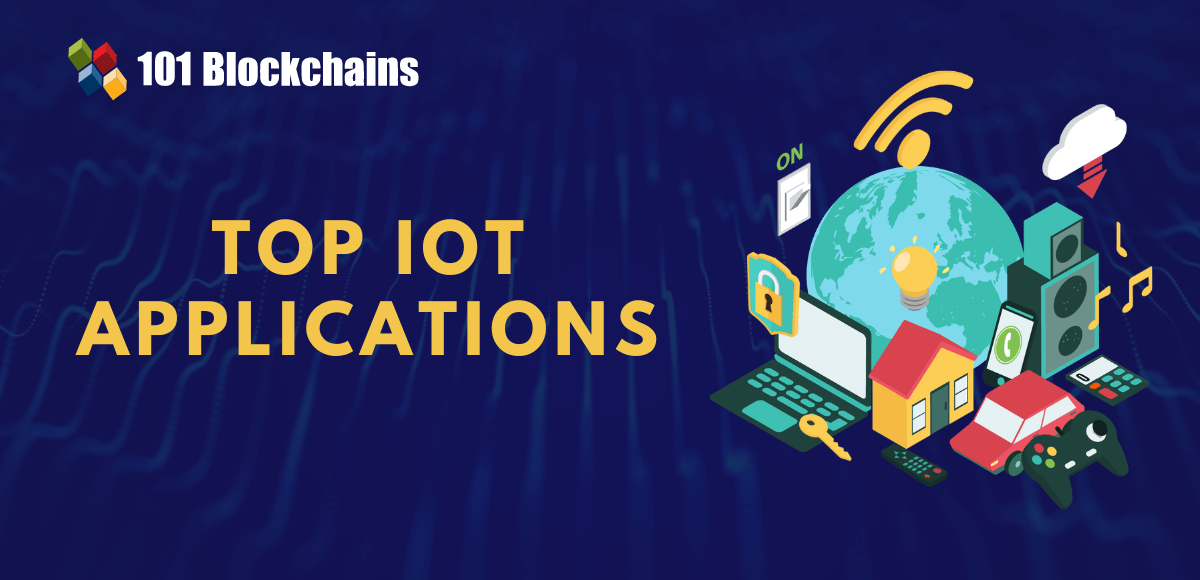Learn how blockchain truly works, master key definitions, and uncover what makes smart contracts so "smart." Dive into the fundamentals, gain valuable insights, and start your blockchain journey today!

Career Guide
James Howell
on April 14, 2023
How To Build A Career In IoT?
The number of IoT devices all over the world will have surpassed 14 billion in 2022. Predictions suggest that the world will have over 30 billion IoT-connected devices by 2030. At the same time, growth in investments in IoT startups has also created profound waves in the tech industry. If you want to build a career in IoT, you would not be the first one.
The consistent growth of IoT industry has opened up the prospects of career development for skilled professionals and engineers. Around 47% of companies encounter a shortage of IoT talent and rely on outsourcing IoT project responsibilities. Considering the fact that Internet of Things would create economic value of almost $4 trillion to $12 trillion by 2030, it is important for businesses to hire IoT experts.
At the same time, people who want to learn IoT could find exclusive opportunities for developing their careers. However, it is important to identify the ideal career development routes and the skills you need for an IoT career. The following post offers you a detailed guide on job roles you can pursue in IoT and an outline of important skills of IoT professionals. In addition, you can also learn the best practices for developing your career as an IoT expert.
Why Should You Pursue IoT Jobs?
Before you find out an ideal IoT career path, it is important to know the reasons to pursue IoT jobs. Most of you may have concerns about the long-term feasibility of jobs in the domain of IoT. Is it safe to pursue a career in Internet of Things? Interestingly, you can find a convincing answer in the predictions for growth of IoT market.
As of 2022, global spending on IoT solutions reached $1 trillion. In 2023, the worldwide expenses on IoT solutions could cross more than $1.1 trillion. Different IoT applications in the smart home category, especially the video entertainment category, have garnered spending worth $192 billion in 2022. As a matter of fact, consumer media and internet devices account for the highest IoT revenue in 2022 at $101.8 billion.
You must have found answers to “Is IoT a good career?” from the statistics about IoT industry. At the same time, choosing IoT as a career option is a crucial decision for any individual. You need to reflect on the value of IoT as a technological innovation to understand whether it can guarantee long-term career benefits.
IoT has been a crucial driver of digital transformation in our everyday lives through use cases in smart homes and smart cities. On top of it, the industrial use cases of IoT in agriculture, manufacturing, retail and supply chain management expand the scope of the IoT industry. The value advantages of IoT would play a critical role in encouraging large-scale IoT adoption, thereby fuelling the demand for IoT jobs.
Are you ready to take your career to the next level? Join our Premium plan now and get access to exclusive web3 & blockchain job listings on 101 Blockchains.
Scope for Career Development in IoT
The next important highlight in a guide to your career in IoT would point at the scope for career development. What are the roles you can explore in the domain of IoT? What is the expected salary for IoT jobs? Which companies are hiring IoT professionals? The answers to these questions can help you visualize the IoT talent market and identify relevant opportunities according to your goals. Let us dive deeper into details regarding the scope for career development in IoT.
Popular Job Roles in IoT
If you want answers to “How do I start a career in IoT?” you must start with an overview of important job roles in IoT. Awareness regarding the job roles in IoT industry could help you in setting clear career development objectives. Here are the popular job roles in the domain of IoT.
- Cloud engineers take on the responsibility of creating and deploying the middleware and NoSQL database for collecting IoT device data.
- IoT designers are capable of leveraging their CAD expertise to improve design of IoT devices.
- Material specialist roles in IoT have a better understanding of the materials for IoT devices that can support embedded sensors.
- You can become an IoT professional in the role of an embedded engineer for development and implementation of embedded device software.
- Data scientist roles in the field of IoT focus on analysis of IoT data through batch processing or in-memory computing for extracting useful insights.
- Network engineers in IoT work on creating the IoT network, selecting suitable gateways and more tasks for IoT network optimization.
- IoT programmers are professionals involved in creating the application logic for the backend of IoT solutions. In addition, programmers have to integrate the backend program with cloud databases and middleware.
- Data visualization expert roles are also important choices in an IoT career path for aspiring candidates. Data visualization experts work in coordination with IoT data analytics teams to create a comprehensible visual representation of data insights.
- IoT data architect job roles are also top choices for professionals interested in IoT jobs. The basic responsibility of IoT data architects focuses on designing the data model for IoT networks.
- Instrumentation engineers in the field of IoT take on the task of managing sensors, actuators and other devices in the IoT network.
Want to understand the fundamentals of the Internet of Things (IoT)? Become a member and Enroll Now in IoT Fundamentals Course!
Which Companies Hire IoT Professionals?
Before you invest your efforts in choosing a course to learn IoT and important skills, you must have doubts about your employment prospects. IoT adoption has constantly been increasing, and businesses leverage Internet of Things for innovative digital transformation journeys. Therefore, many companies seek IoT professionals in different job positions to support their journey of IoT adoption. Here are some of the top companies which seek IoT talent.
- Huawei
- IBM
- SAP
- Siemens IoT Analytics Company
- Bosch IoT Sensor Company
- Cisco
- GE Digital
Salary Expectations for IoT Professionals
The career guide for aspiring IoT professionals would also invite attention to the expected salary estimates. The expected IoT jobs salary estimates would vary according to different factors. For example, the job role, experience and location of job play a vital role in determining salary of IoT professionals.
How much can an IoT engineer earn in a year? An entry-level IoT engineer could earn an average annual salary of $110,000. With some additional skills and experience, IoT engineers can earn around $130,000 per year. On the other hand, salary estimates for other roles such as IoT application programmer, embedded systems developer or system programming would depend on the job responsibilities.
Want to familiarize yourself with the technology stack associated with IoT? Become a member and Enroll Now in Internet Of Things (IoT) – Intermediate Level Course!
What Do You Need to Learn for IoT Jobs?
The scope for career development in IoT showcases bright prospects for every aspiring IoT professional. You can become an IoT professional and capitalize on emerging job opportunities by diving into essential aspects of IoT networks. Here is an outline of the important areas you must cover before pursuing IoT jobs.

-
Data Analytics
A major share of your career in IoT would revolve around data and its effective utilization for deriving insights. Internet of Things can help in accessing heaps of data from multiple devices in the network. As a data analytics professional, you need to identify insights that can help businesses in optimizing operations or improve the IoT network. Candidates must develop fluency in statistical understanding alongside the ability to identify correlations and create presentable data visualizations.
-
Networking Structures
The list of important skills required for your IoT career path also includes networking expertise. IoT networks involve complex hardware setups with massive amounts of sensors and wires intertwined with different ports and peripherals. At the same time, a small error in a single connection could lead to glitches in the functionality of IoT devices.
In such cases, the expertise of an IoT network architect could help in ensuring functional and resilient network setups. IoT professionals need to learn the skills for developing efficient network architectures which follow relevant communication protocols without wiring issues.
-
Smart Devices
An IoT professional must also have an in-depth understanding of smart devices. The answers to “How do I start a career in IoT?” would feature the necessity of learning about IoT hardware and devices. Does a sensor make a device ‘smart’? Organizations have to work on modification of IoT devices so that they can fit with the network requirements.
IoT professionals need comprehensive knowledge of the different sensor modules, protocols, integrators and transmitters for adapting to the IoT network deployment needs of an organization. At the same time, IoT professionals must also stay updated with new devices and technologies in the mainstream technology market.
-
User Interface Programming
The responsibilities of IoT professionals also require skills in user interface programming. You can find better IoT jobs salary estimates with all-round skills in optimizing IoT solutions. For example, an IoT engineer could use their skills for UI design to ensure that a specific IoT solution garners the attention of users in the market.
As an IoT professional, you must ensure that a specific IoT solution addresses the pain points of users. You should have the skills to design a creative and easy-to-use UI that users can navigate with limited difficulty. Therefore, aspiring IoT professionals must also hone their skills in creativity and design.
-
Embedded Hardware
The search for reliable avenues to build a career in IoT would also lead you to the requirements of skill in embedded hardware programming. IoT jobs would require professionals to have in-depth knowledge about configuring suitable sensors and actuators for an application.
You must learn how to test different tools alongside ensuring compliance with best practices for selection of components for IoT networks. IoT professionals should also have an interest in research and stay updated with latest technological advancements and innovations in IoT industry.
-
Embedded Software
What is the life force of an IoT network? The embedded software in IoT devices tells them what to do in different interactions. The role of an embedded software engineer is one of the prominent options for career development in the field of IoT. In the role of embedded software engineer, IoT professionals have to create software that helps IoT devices access utilities required to resolve the concerned problem. On top of it, embedded software expertise helps IoT professionals integrate IoT software with non-computing devices, thereby maximizing the use of IoT hardware.
-
Artificial Intelligence and Machine Learning
The final addition among the skills required to become an IoT expert points to artificial intelligence and machine learning. You should learn IoT with a vision for embracing new technologies such as AI and machine learning. Why? AI and machine learning can complement IoT solutions focused on big data analytics. In addition, machine learning and AI could provide the foundations for creating truly ‘smart’ IoT networks.
Start learning Blockchain IoT with World’s first IoT (Internet Of Things) Skill Path with quality resources tailored by industry experts Now!
How Can You Become a Certified IoT Professional?
The outline of job roles in IoT, scope for career development in IoT industry and skills required for IoT professionals bring us to the most critical point in this discussion. You know what you need to become an IoT professional, albeit without any plan for achieving the objective. Here are some of the best practices you need to follow to land IoT jobs of your choice.
-
Set Your Career Goals
The first step in pursuing career development in the IoT industry involves setting clear career objectives. Find answers to “Is IoT a good career?” and clear your doubts about building a career as an IoT professional. Review the different job roles available in the domain of IoT and identify the suitable picks according to your interests. Do you want to become an IoT developer or an embedded systems designer? Does the prospect of a career as an IoT security engineer appeal more to you? Establish your objectives for learning IoT before you set off on your journey.
-
Develop the Required Skills
The lucrative IoT jobs salary estimates can be one of the reasons to encourage you to learn more about IoT. However, you have better chances of landing high-paying IoT jobs with a comprehensive set of IoT skills. Starting from data analytics to networking and UI design or embedded systems design, IoT professionals need to develop many skills. Imagine how employers would value your profile when they find out you have the skills to take care of multiple facets of their IoT solutions.
-
Validate Your IoT Skills
The next crucial step in recommended practices to build a career in IoT would focus on verification of IoT skills. Explore credible and professional training courses on IoT fundamentals and work on practical IoT projects. You can also create your own IoT solution focused on basic consumer or industrial use cases to showcase practical expertise. In addition, you should seek skill paths for mastering the different skills required for IoT professionals. Ultimately, you need to look for reliable IoT certifications to improve your portfolio as an IoT professional.
Conclusion
The guide on developing your career in IoT showcases comprehensive insights on important information required for pursuing IoT jobs. You can build your career as an IoT professional by exploring multiple job roles. In addition, you must also clear your doubts about the scope for career development in IoT. Once you have the assurance of opportunities for career development as an IoT professional, you need to identify the important skills required for IoT jobs.
The best practice recommended for aspiring IoT professionals focuses on learning different aspects of IoT, such as data analytics, networking, security, UI design and embedded systems programming. Finally, you can follow the best practices for establishing your identity as a credible IoT expert with fluency in important IoT skills. Explore the domain of IoT in detail and identify new avenues for a career in Internet of Things right now.






